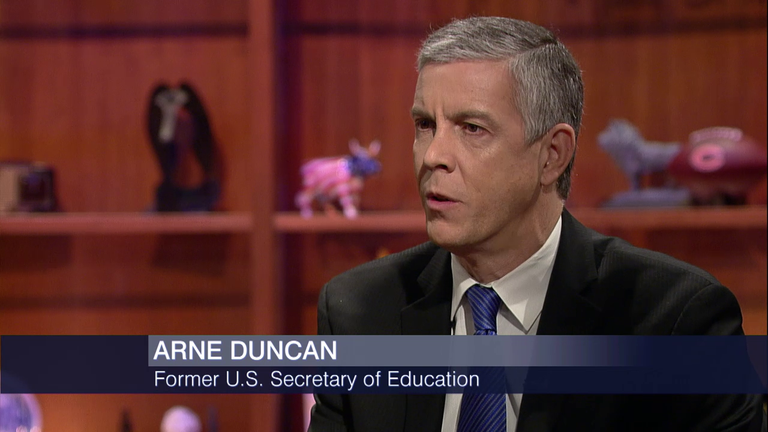Arne Duncan spent seven years running the failed Chicago Public Schools. Remarkably, that led to another seven years as U.S. Secretary of Education. During his tenure in Washington, Duncan introduced Common Core, as well as a cadre of new standardized tests. Tom Loveless, an education expert at The Brookings Institute confirmed Duncan’s big government bias, saying, “He definitely expanded the role of the Department of Education.
Duncan appeared on WTTW’s Chicago Tonight last week to advocate a theoretical school funding formula that, in practice, would further expand government-run education in Illinois and increase spending.

It is important to note that, since the beginning of Duncan’s tenure as CPS superintendent, funding to education increased year after year, while the results in the district showed little to no improvement.
In fact, after 14 years of Duncan at the helm of education, of CPS high school students who graduate in four years, less than 20 percent of them will be considered “college ready.” And the average amount spent per student for the year now exceeds $14,000 – which is only operational costs, and does not include funding for school programs, construction grants, targeted initiatives, or even pension payments.
By comparison, my local high school district in Hinsdale (HSD 86) spends $12,357 on operational costs per student and graduates 87% of students college-ready. There are clearly factors outside of spending that are not being addressed by Arne Duncan’s inadequate, bureaucracy-heavy solutions.
Duncan has stated, “When you have a system that actually perpetuates inequity and inequality, we have to challenge that… It’s morally wrong. I can’t put it any more simply – it’s morally wrong and it has to change.”
I agree. But if he really believes that, Duncan should support immediately moving to a system that discontinues the practice of attaching a child’s education and therefore opportunity in life to his parents’ income and zip code.
To his credit, Duncan has – in the past – broken with Democrats on the issue of Charter Schools. He sends his own children to the prestigious University of Chicago Lab School. So he understands the importance of choice in education, especially for his own kids. But if he truly wants equality, he should stridently advocate for all families to have the same options he has enjoyed.
Currently, without a state-approved universal voucher system, the only way low-income families can access better schools is through the help of nonprofits and scholarships. But, the need greatly outweighs the available resources.
Democrats repeat the tired and discredited attack that voucher programs siphon funding away from traditional public school systems.
If anything, the opposite is true. According to research from the Friedman Foundation, such policies actually free up state education dollars, allowing traditional public school districts to spend more per pupil. In many states, such as Indiana and Wisconsin, traditional public schools successfully coexist with charters, private and home schooling programs.
Thirty-three empirical studies (including all methods) have examined school choice’s impact on academic outcomes of students who remain in public schools. Of these, thirty-one—have found that choice improved public schools.
Given the compelling real-world evidence, our objective should not be to expand government, as Duncan did at CPS and in the Obama administration. Such efforts have only increased costs and demonstrated almost no empirical results – despite all of the government-funded theories that hypothetically attach improved results to spending increases. Instead, our objective should be to expand access for families and increase performance incentives for schools.
Look at what works in the real world. Make the money follow the child, as we do at the college-level. Instead of sending education dollars to centralized bureaucracies like CPS, the state should attach those dollars to the students, allowing their parents to choose which school is best for their child. And, as they do at the college-level, schools will be forced to compete for students—forcing CPS teachers and administrators to do their jobs better.
Over and over again, empirical evidence has supported the case for investing in families instead of bureaucracy. Yet, Duncan and other leftists continue to push the latest and largest big government theories and formula, running away from the facts (and often, their own experiences). Because they are afraid. Afraid to confront their misguided beliefs. Afraid to take on feckless teacher unions. Afraid to admit that they have crushed hope and opportunity for so many for so long so they could stay in power.
Cowards are afraid.






One Response
Comments are closed.